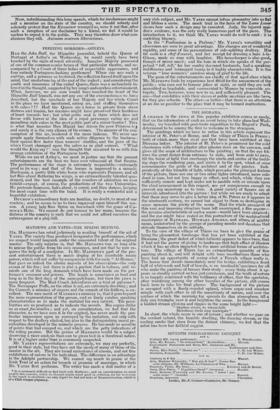MATHEWS AND YATES—THE SPRING MEETING.
MR. MATHEWS has acted judiciously in availing himself of the aid of YATES. The variety thus produced invigorates the performance, which we suspect would languish under the unassisted talent of the original master. The only surprise is, that Mr. MATHEWS was so long able to amuse the public from his own resources, and not that he now re- quires the help of a coadjutor. In Mr. MATHEWS'S part of the pre- sent entertainment there is much display of his inimitable comic power, which will not suffer by comparison with the early " At Homes," that gave us indeed the choice morsels of his observation—the very cream of his fun ; but there is alsti a portion that is tedious, and re- minds one of the long demands which have been made on the per- former's resource and powers. The laugh is sometimes as loud and long as in the first days of the monopolylogue, but then the yawn is more frequent. The Mail Coach Adventures are a trial of patience*. The Newspaper Puffs, on the other hand, are extremely diverting ; and the Concert, a mimicry of singers and the conceit of the fiddlers, is ex- cellent. The rare merit of MATHEWS'S mimicry is, that it goes beyond the mere representation of the person, and so finely catches speaking characteristics as to make the imitated his own satirist. The pecu- liarities are so produced as to indicate the morale. His copies strike us as exact fac-similes ; and yet, on consideration, we feel that the character, as we have seen it in the original, has never made the par- ticular impression upon us conveyed by the imitation, not only with respect to the drollery elicited, but also to the distinguishing moral pe- culiarities developed in the mimetic process. He has made us sensible of points that had escaped us, and which are the petty indications of the ruling passion. But the genius of MATHEWS would be a subject deserving a nicer analysis than can be given to it in a theatrical notice. It is of a higher order than is commonly suspected. Mr. YATES'S representations are extremely, we may say perfectly, good in their style, but they have not the nicety of many of those of his master in the art. They are broad caricatures of classes, and not fine exhibitions of nature in the individual. The difference is an advantage in the Adelphi partnership. We cannot say much in praise of the Irish Trial of an action for breach of promise of marriage, in which Mr. YATES first performs. The writer has made a dull-matter of a * It is extremely difficult to find fault with Mathews ; and on consideration we must qualify this censure, which we thought might stand good in criticism, for his Scotsman in the coach is excellent—we only regret we had not more of his conversation, which is Of a Chili vinegar piquancy. very rich subject, and Mr. YATES cannot infuse pleasantry into so flat and lifeless a scene. The mock trial in the farce of the Lame Lover shows how such a design may be executed. Judy, the injured mai- den's evidence, was the only really humorous part of the piece. The introduction to it, we think Mr. YATES would do well to omit : it is surfeiting blarney. In the " Pantomime in a Parlour," Mr. YATES'S versatility and cleverness are seen to great advantage. His changes are of wonderful rapidity, and some of his personations of side-splitting drollery. His, fat cook is a chef d'teuvre, and her receipt for dressing a hare a-la- Glasse, made us roar with laughter. His housekeeper is also good, though of minor merit; and the tone in which she speaks of the per- petual " toll, toll," for her sundry deceased husbands, had a speaking. indifference and termagant twang in it highly characteristic. It is this veteran " lone woman's" careless slang of grief to the life.
The puns of the entertainments are chiefly of that aged class which Mr. MATHEWS finds by experience best fitted for the amusement of the public ; who care not to honour jokes at sight, or until they are well accredited as laughable, and consecrated to Momus by venerable an- tiquity. Two, however, were new to us, and sufficiently pleasant. The one—that constables with their staves at public meetings are like bees, for they give whacks. The other—a better—that there is an attentiom at an inn so peculiar to the place that it may be termed inattention.


















 Previous page
Previous page